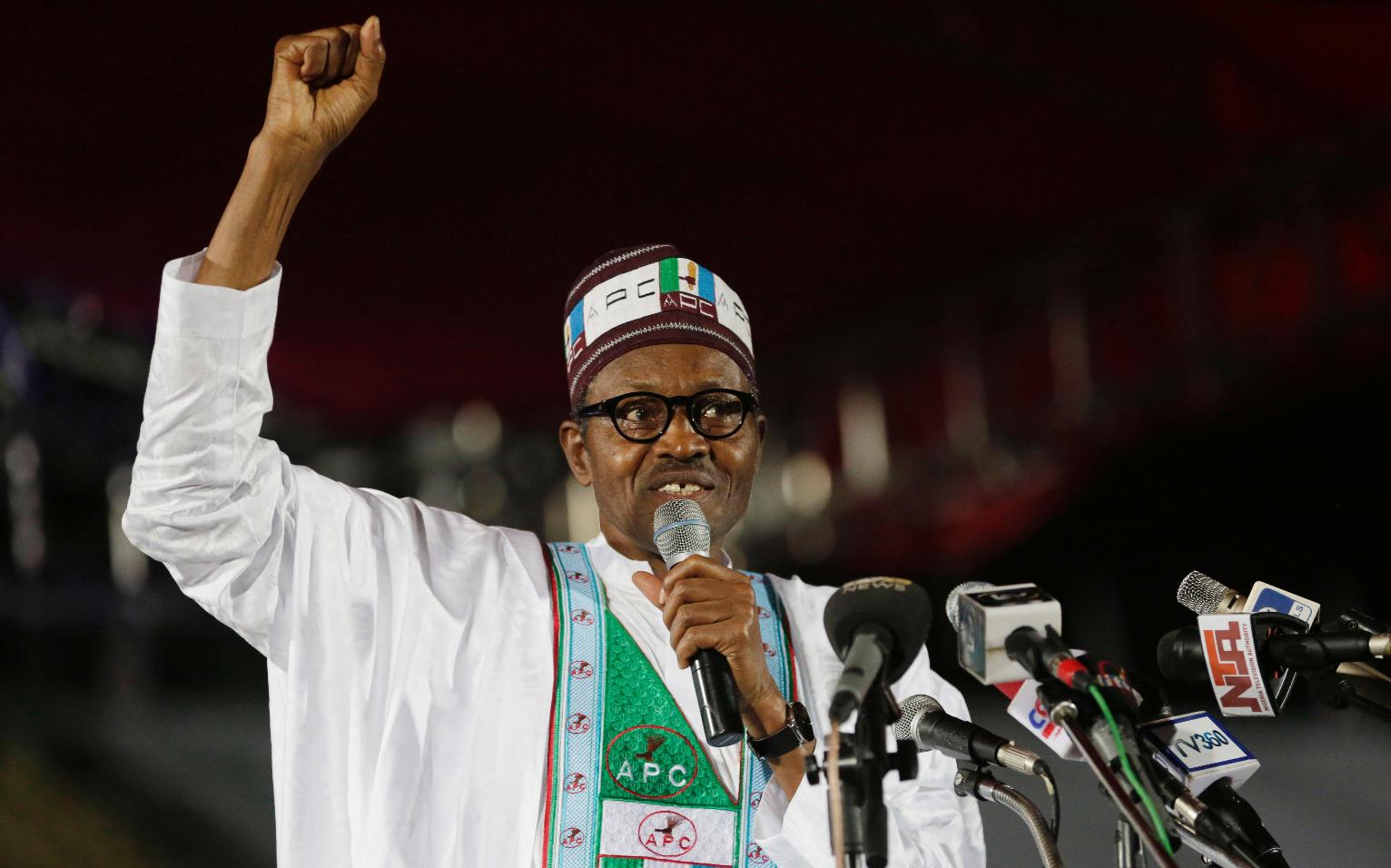by Siobhán O’Grady
Calling himself “a converted democrat,” Muhammadu Buhari, a former Nigerian dictator accused of instigating deadly post-election violence in 2011, preached the importance of a free, fair, and safe Nigerian election in a London speech Thursday.
Buhari, whose current campaign for the Nigerian presidency centers on taking a harder line against government corruption and the Boko Haram terror group, first came to power through a coup in 1983 and was deposed by another in 1985. Nigeria transitioned to democratic rule in 1999, and after Buhari’s third unsuccessful bid in 2011, more than 800 people were killed and 65,000 displaced when Buhari’s supporters rioted in 12 northern states.
But on Thursday, he said a peaceful election in Nigeria would help other African countries develop into Western-style democracies. “It is clear that though many African countries now hold regular elections, very few of them have consolidated the practice of democracy,” he said.
Buhari led Nigeria for 20 months in the 1980s that were marked by widespread political arrests and strict economic policies, a period he has in the past euphemistically described as a “war against indiscipline.” His reputation as a hardened military ruler has undermined his current campaign, which was extended by six weeks after the elections, originally scheduled for Feb. 14, were postponed for security reasons.
The elections are now slated for Mar. 28, when Buhari will face the same candidate he lost to in 2011, incumbent Goodluck Jonathan. Although some analysts think Jonathan has the upper hand, polls show the candidates are essentially neck and neck.
As he carries out his fourth attempt to democratically gain power, the events surrounding his third presidential campaign continue to haunt the former military ruler. Earlier this month, Dutch lawyer Goran Sluiter submitted a complaint on behalf of a coalition of seventeen Nigerian NGOs and two individual clients that asked the prosecutor at the International Criminal Court to probe Buhari’s role in sparking the deadly violence after he lost the 2011 election. Evidence submitted with the complaint includes a video of Buhari speaking in Hausa at a campaign rally, Sluiter said.
According to Human Rights Watch, pro-Buhari rioters carried out a campaign of arson, rape, and widespread killings in the aftermath of that election, targeting ethnic groups perceived to support the ruling party. Many of Buhari’s supporters are Muslims, so some of the victims retaliated with counterattacks on mosques. The situation quickly escalated, displacing an estimated 65,000 people.
Sluiter told Foreign Policy that his clients believe Buhari encouraged his supporters to riot if he lost. Probes at the ICC pertaining to post-election violence, including ones from Kenya and Ivory Coast, offer hope to his clients that Buhari’s case will be taken on by the court, Sluiter said.
“If you look at those cases, it’s a copy — almost a replica — of what happened in Nigeria,” Sluiter told FP.
After the 2011 riots, Jonathan promised to launch a full-fledged investigation. Officials initially arrested approximately 500 accused perpetrators, but largely dropped the issue, especially after Boko Haram launched a wave of attacks in large parts of northern Nigeria and emerged as a major threat to the country’s overall security.
Boko Haram’s campaign of violence and territorial gains in the north have now forced the postponement of the elections. Given Nigeria’s history of election-related violence, there is concern that the country’s army would be unable to carry out its campaign against the militant group while also providing security on election day and in subsequent weeks. (Sluiter said his clients filed the complaint prior to the election in hopes that it would encourage safer conditions for Nigerians on voting day.)
Buhari’s questionable past and Jonathan’s apparent inability to defeat Boko Haram have caused a dilemma for Nigerian voters, many of whom feel the choice is about identifying the lesser of two evils. Joe Siegle, director of research at the Africa Center for Strategic Studies, told FP that to vote for Buhari and trust he won’t revert to militaristic tendencies would “be a leap of faith.”
“So many Nigerians are really struggling to support either candidate because each come with some serious flaws,” he said.
But Buhari, who addressed his tarnished past but did not comment on the ICC complaint during his speech at Chatham House, said he has been disappointed by media reports labeling him a “dictator.” “Let me say without sounding defensive that dictatorship goes with military rule, though some might be less dictatorial than others,” he said. “I take responsibility for whatever happened under my watch.”
A campaign spokesman has denied that Buhari had any involvement in the 2011 violence, saying only that accusations are “all part of the campaign to stop Buhari at all cost.” And in Buhari’s speech on Thursday, he even said that successful democracies have convinced him “that change can be brought about without firing a single shot.”
But according to Sluiter, even if the violence wasn’t carried out by Buhari himself, the ICC has in similar cases been able to trace back the instigation to political leaders. And if the case is taken by the ICC, it is likely, Sluiter said, that argument will be used again.
“The most responsible are often those in the position of power…who want to win the election at all costs,” he said.
Siobhán O’Grady is a fellow at Foreign Policy. She joined FP from the Houston Chronicle’s Washington, D.C. bureau, where she reported on border security, drug cartels, prison reform, and all things Ted Cruz. Her work has appeared on WBUR and in the Houston Chronicle, the San Antonio Express, and the San Francisco Chronicle, among others. She can be reached through [email protected]
The opinions expressed in this article are solely those of the author.







